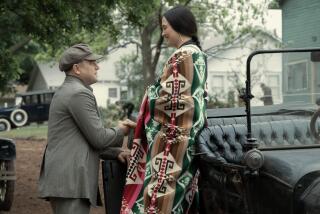MOVIE REVIEW : Audacious Slant on ‘Edward II’
Most movie adaptations of historical dramas are so plumped and perfumey that, at first, Derek Jarman’s “Edward II” (at the Hillcrest Cinemas), set in 1307, is bracingly off-putting. In its construction and dramatic approach to history, Marlowe’s 1594 play was a major influence on Shakespeare, particularly his “Richard II.”
The plot is superficially about the events leading to the downfall of Edward II (Steven Waddington) but on a deeper level, and particularly in Jarman’s version, it’s about how Edward’s love for his friend Piers Gaveston (Andrew Tiernan) scandalizes the court and condemns them both.
Jarman doesn’t merely bring to the surface the homosexual innuendo in the play. He exults in it. In the process, he deliberately works into his movie all manner of anachronism. The characters’ costumes are a mixture of contemporary and period styles; the language, though essentially Marlowe’s, is peppered with modernisms; the sets are minimalist and blocklike; even Annie Lenox gets to perform a number.
No doubt a tight budget had a lot to do with these decisions. But the wayward modernization also serves Jarman’s attempted parallels with contemporary society. He sees Edward’s tragedy as a monstrous outcropping of homophobia, 14th-Century style. The links to contemporary mores are explicit: At various times modern-dress protesters chant and carry signs reading “Stop violence against gays and lesbians.”
Considering the violence perpetrated by Edward and Piers against their subordinates, it’s a bit of a stretch to view their sadism as divine retribution. But this isn’t the way Jarman sees it. Citing the “true love” of Edward, Jarman is quoted in the press notes as saying: “Everything Edward does, including slaughtering so many people, is completely justified. I mean, if Cleopatra is allowed to get away with whatever she gets away with, if Dido and Aeneas, then surely Edward and Piers emerge completely vindicated by history.”
The sentimentalism of this approach may have political force but it doesn’t function emotionally in terms of the movie. As Edward, Waddington isn’t particularly forceful; his love for Piers never captures the poetic ardor that might have transformed the action into a true passion play. Tiernan’s Piers is rakish but one-note; he might be a droog from “A Clockwork Orange.”
Jarman clearly doesn’t want these characters to be “sympathetic”; he wants their homosexuality to carry the kind of taunt and challenge that would shake up the court. But the gallivanting of Edward and Piers isn’t rich enough to build a royal tragedy around, let alone the kind of cosmic tragedy Jarman envisions.
And, by soft-pedaling Marlowe’s denouement, where Edward’s wife, Isabella (Tilda Swinton), and the nobleman Mortimer (Nigel Terry) meet their bloody fate, Jarman brings an uncomfortable masochism to Marlowe’s conception. Edward and Piers are reduced to being martyrs to a cause. They turn into placards.
‘Edward II’
Steven Waddington: Edward II
Andrew Tiernan: Piers Gaveston
Tilda Swinton: Isabella
Nigel Terry: Mortimer
A Fine Line Features release. Director Derek Jarman. Producers Steve Clark-Hall and Antony Root. Executive producers Sarah Radclyffe and Simon Curtis. Screenplay by Derek Jarman and Stephen McBride. Cinematographer Ian Wilson. Editor George Akers. Simon Fisher Turner. Production design Christopher Hobbs. Art director Rick Eyres. Running time: 1 hour, 51 minutes.
MPAA-rated R (language, sex, explicit sex, violence).
More to Read
Only good movies
Get the Indie Focus newsletter, Mark Olsen's weekly guide to the world of cinema.
You may occasionally receive promotional content from the Los Angeles Times.








